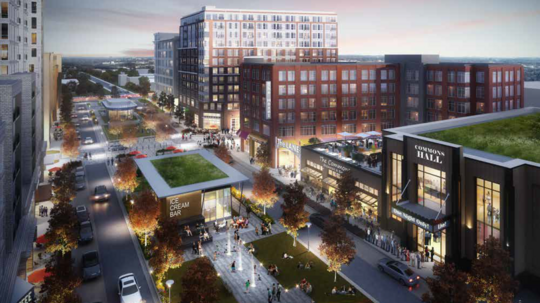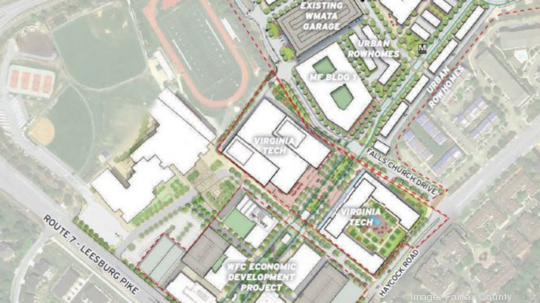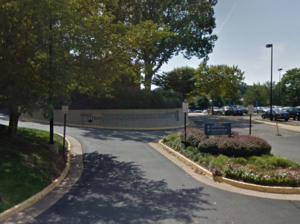
Virginia Tech and the city of Falls Church are teaming up on a new effort to test “smart city” technologies around the university’s graduate campus near the West Falls Church Metro, even as the university's redevelopment plans for that campus remain in flux.
Though the university recently scuttled plans to redevelop its 5.3-acre Falls Church campus and shut down one of the degree programs it runs there, VT is proceeding with a “connected infrastructure demonstration project” thanks to $10 million in funding secured by Virginia Senate Majority Leader Dick Saslaw, D-Fairfax in the state's most recent budget.
As part of the initiative, the university and the city will build sensors into the area’s infrastructure in conjunction with the redevelopment of George Mason High School. Falls Church will work with the Blacksburg-based university to create a new data management system, then feed in information collected from sensors placed in local roads, traffic lights, parking meters and other pieces of city infrastructure to study the transportation network.
Project will fund new street, smart sensors
The funding will also allow for the construction of a new road perpendicular to U.S. Route 7 bisecting the university’s Northern Virginia Center on Haycock Road, providing a new link to the Metro station and the separate mixed-use development WMATA is planning for part of its property nearby. The Virginia Tech Transportation Institute, which runs similar experiments at its Blacksburg facility, will be able to use the new road to conduct connected car and autonomous vehicle research.
But university leaders say they want to share the data collected in Falls Church among more than just their own researchers. While they’re enthusiastic about the possibility of students at the campus getting a granular look at how a major highway like Route 7 operates, they also want to make this information available to city leaders to inform traffic management strategies. And they envision the campus becoming a “plug-and-play test bed,” where private companies can experiment with their own sensor technologies.
“It’s an opportunity for our students and researchers to have a living laboratory next to our facility,” said Myra Blanco, director of advancement, partnerships and outreach at the Virginia Tech Transportation Institute. “You usually see some of these concepts in modules in different areas. This provides a one-stop-shop for all these different concepts all close together.”
The project will require coordination with the Virginia Department of Transportation, which manages Route 7, but also the development team that’s currently hard at work on the massive redevelopment of the George Mason High School site nearby. Hoffman & Associates, EYA and Regency Centers Corp. have been working with the city for years now to transform the school property into a 1.4-million-square-foot mixed-use project, and those new buildings and the streets that run between them will include an array of advanced sensors thanks to this “smart city” effort.

“We’ll be able to get some really interesting real-time data around what will soon be one of the most densely developed areas in Northern Virginia,” said Falls Church City Councilman Ross Litkenhous. “We’re talking about adaptive lighting, sensors in the parking structures, cameras on the roadway. We’ll be able to take a real look at what is happening at that intersection of Route 7 and Haycock Road.”
Transportation project separate from campus overhaul
But the smart city experimentation will be limited to the high school redevelopment, now that Virginia Tech has called off plans for the mixed-use overhaul of its own campus. The university spent years sketching out plans for the construction of some new academic, residential and office buildings on the site, but abruptly announced the dissolution of its planned partnership with Hitt Contracting, Inc. and Rushmark Properties in early March.
School officials said there is no connection between this new smart city initiative and the cancellation of its redevelopment plans.
Officials in both Falls Church and neighboring Fairfax County said they believed that was true, particularly because the smart city project was advancing for months in tandem with the redevelopment. Litkenhous said the city is holding out hope that the university still proceeds to remake the site, as it currently “breaks up the continuity” the city is building in the area with the WMATA development and Mason project.
Should the university revive its plans, Blanco said there’s no reason it couldn’t become part of the smart city work. This project is meant to serve as a “foundation and stepping stone for more growth, more research and more economic development for the area,” and there could always be more pieces added later, she said.
Blanco said her more immediate concern is getting the project ready for launch when the $10 million arrives in July, and coordinating construction with the city and the Mason site developers.
The high school redevelopment has been delayed slightly because of the uncertainties of the pandemic, though the city hopes it can finish much of the demolition of the old high school by the end of May. That would set up construction to begin soon afterward, with delivery planned for late 2023 or early 2024.
“All of this is going to have to be done in coordination with the development of the site, so it certainly be won’t be tomorrow that this is online,” Litkenhous said. “We will need to be very careful with the cadence, which is quite a daunting task. But I think it’s something we’re up to.”
